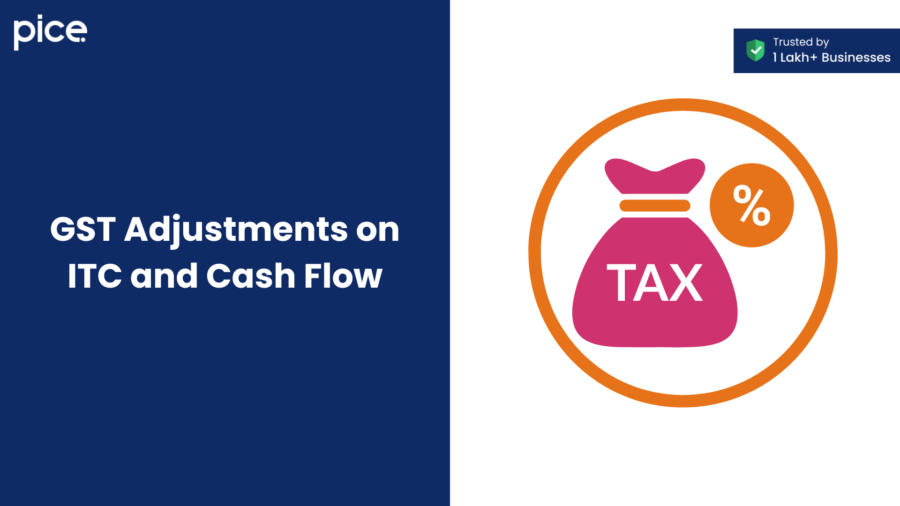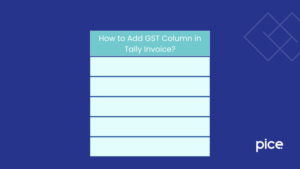Managing GST Payments and Cash Flow
- 17 Sep 24
- 10 mins

Managing GST Payments and Cash Flow
Key Takeaways
- Effective cash flow management is crucial to navigating the impact of GST on business operations.
- Input tax credits can significantly improve cash flow but require diligent matching and compliance.
- Managing business working capital efficiently helps mitigate the cash flow crunch caused by GST payments.
- Vendor compliance and automation are key to avoiding unmatched credits and maintaining smooth cash flow.
- Timely GST compliance and staying informed on regulatory changes are essential to prevent financial strains.
Effective cash flow management is crucial for any business, and understanding the impact of GST on cash flow is an essential component of this process. GST (Goods and Services Tax) has significantly altered the taxation landscape for businesses, affecting various aspects like input tax credits, working capital, and the overall financial health of companies.
Breaking Down GST
The Goods and Services Tax (GST) is a comprehensive, multi-stage, destination-based tax levied on the supply of goods and services. For businesses, managing GST involves understanding its intricacies, including the services tax, tax rate, and actual credit availment. The impact of GST on cash flow is multifaceted. For instance, while GST aims to simplify the taxation process by consolidating various taxes into a single regime, it can also lead to cash flow issues if not managed properly.
💡 If you want to pay your GST with Credit Card, then download Pice Business Payment App. Pice is the one stop app for all paying all your business expenses.
One key aspect is the concept of input tax credits (ITC). ITC allows businesses to claim credit for the GST paid on purchases used to make taxable supplies. However, businesses often face challenges with unmatched credit and the denial of credit due to mismatches between their records and those of their vendors. This discrepancy can lead to cash flow crunches and headaches for businesses, particularly when trying to manage their GST for businesses efficiently.
Automating the credit matching process and ensuring vendors file their returns on time can help mitigate these issues. Companies should use automation tools to manage vendor rating and keep track of their GST compliance. This will not only facilitate actual credit availment but also maintain a perfect business sense, ensuring a steady business income and minimizing cash flow issues.
Defining Business Working Capital
Business working capital refers to the funds needed to manage the daily operations of a business, including expenses for businesses such as paying vendors, meeting business urgencies, and managing business hours effectively. Proper calculation of business working capital is vital for sustaining operations and driving business profits.
The introduction of GST has had a notable impact on business working capital. With the new tax regime, businesses must pay GST on their purchases upfront. This leads to a temporary cash outflow until the time they can claim input tax credits. For businesses heavily reliant on taxable supplies, this creates a situation where cash is tied up in GST payments, affecting their business cash flows. Additionally, the rate for businesses can vary depending on the nature of goods and services provided, influencing the amount of working capital required.
The mismatch of ITC or disallowance of credit further complicates the scenario. Suppose a recipient taxpayer cannot avail of the eligible credit due to issues such as the reversal of credit or unmatched credit. In that case, they may face a negative cash flow impact, limiting their access to cash. These factors underscore the importance of attention to business working capital and efficient management of GST payments to avoid cash flow issues.
Advantages of Effective Working Capital Management
Effective working capital management brings several benefits, especially in the context of GST:
- Improved Cash Flow: By managing GST in cash and ensuring the timely filing of returns, businesses can maintain a smooth cash flow. This is crucial to cover business expenses on time, fulfill commitments on time, and avoid periods of cash crunches.
- Maximizing Input Tax Credits: Properly managing ITC, including the matching of credit and addressing the Input Tax Credit Twist, helps businesses maximize their credits and reduce their GST liabilities. This directly impacts cash flow positively, allowing businesses to retain more capital for operations.
- Reduced Business Costs: Efficient working capital management leads to better negotiation with suppliers and vendors through automation. A good rating for vendors can lead to more favorable payment terms, further easing the cash burden on the business.
- Access to Funds: Effective management of working capital ensures that businesses have access to cash when needed, minimizing the impact of negative cash flow impacts. For businesses using the cash basis of accounting, managing GST payments effectively can provide a one-off permanent cash flow injection, improving their financial position.
- Financial Stability: With a stable cash flow, businesses can focus on their core activities, ensuring long-term growth and stability. It also allows businesses to plan for future business activity statement liabilities and manage their corporate cash efficiently.
Effects of GST Adjustments on ITC and Cash Flow

The GST regime has brought several changes to how input tax credits are handled, directly affecting cash flow. Businesses must now ensure that their GST returns and payments align with the latest GST regulations to avoid credit refusal and cash flow disruptions.
- Matching of Credit: The GST system requires automatic credit matching between the supplier's and recipient's filings. Any mismatch results in the denial of credit, which can severely impact cash flow. Thus, businesses need to keep a close eye on vendor ratings and ensure that their vendors are compliant with GST rules.
- Unmatched Credit: If a supplier fails to declare their outward supplies in their GST returns, the recipient taxpayer may face a disallowance of credit, leading to cash flow issues. Businesses should regularly monitor their GST transactions to avoid unmatched credits and the resulting financial strains.
- Impact on Cash Flows: Adjustments to the GST framework, such as changes in ITC eligibility or alterations in GST rates, can significantly impact business cash flows. For example, higher GST rates on certain goods or services can increase the overall tax liability, leading to a situation of cash crunches for businesses that may already be operating on thin margins.
- Quarterly Filings: The requirement for quarterly filings for businesses adds another layer of complexity to managing cash flow. Businesses need to ensure their annual GST return and other filings are done on time to avoid penalties and maintain a smooth flow of input credits.
- Canadian Businesses: For Canadian businesses operating in India, understanding the nuances of GST on businesses is crucial. The GST framework can differ significantly from their home country's tax system, requiring careful planning to manage cash flow effectively.
Implications for Taxpayers
For taxpayers, particularly businesses, the implications of GST on cash flow can be profound. Here’s what you need to consider:
- Timely Compliance: To avoid the negative impacts of GST on cash flow, businesses must ensure that all GST returns and payments are filed promptly. Late filings can result in penalties and interest, further straining cash flow.
- Managing Business Cashflows: Proper management of business cashflows under the GST regime is essential. This involves keeping track of input credits, ensuring the timely payment of GST dues, and avoiding unnecessary credit reversals.
- Vendor Management: Businesses should adopt a proactive approach in managing vendors through automation. This involves tracking the compliance status of vendors to ensure seamless credit availability. A good vendor rating system can help in selecting vendors who comply with GST regulations, thereby minimizing the risk of unmatched credits and ensuring a smooth cash flow.
- Cash Flow Planning: Businesses need to prepare for the impact of GST on cash flows by setting aside adequate funds to meet their GST liabilities. Utilizing tools like advantage of cash accounting can aid in maintaining liquidity.
- Adaptation to Changes: The GST regime is dynamic, with frequent changes in rules and regulations. Taxpayers must stay informed about the latest GST changes and their implications for input tax credits and cash flow to adapt their financial strategies accordingly.
In conclusion, the impact of GST on cash flow is significant, with both challenges and opportunities for businesses. Effective management of GST payments, input tax credits, and working capital can lead to a healthier cash flow, reduced costs, and improved financial stability. By understanding the nuances of GST and implementing strategic cash flow management practices, businesses can navigate the complexities of the GST regime and ensure sustainable growth.
FAQs
Does GST go on the cash flow statement?
What impact does tax have on cash flow?
What is the impact of GST on cash discount?
Does GST affect cash back?
Is tax a cash inflow or outflow?
What is the formula for cash flow?
Cash Flow = Cash Inflows - Cash Outflows.
Cash inflows include money received from sales, investments, and financing, while cash outflows consist of expenses, taxes, and operational costs. This formula helps businesses assess their financial health by measuring the net change in cash over a specific period.
 By
By 

















